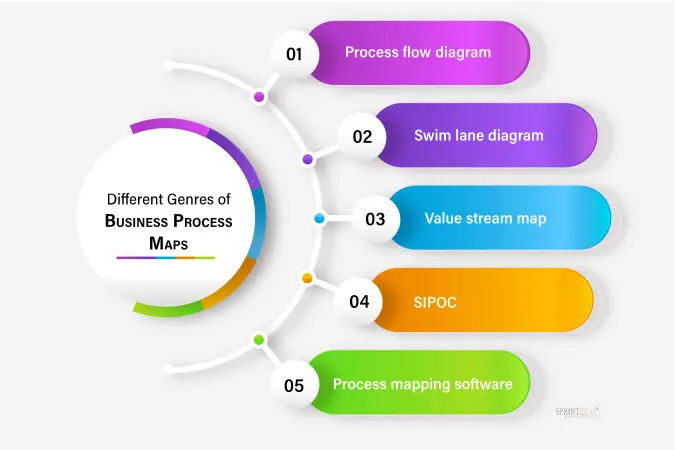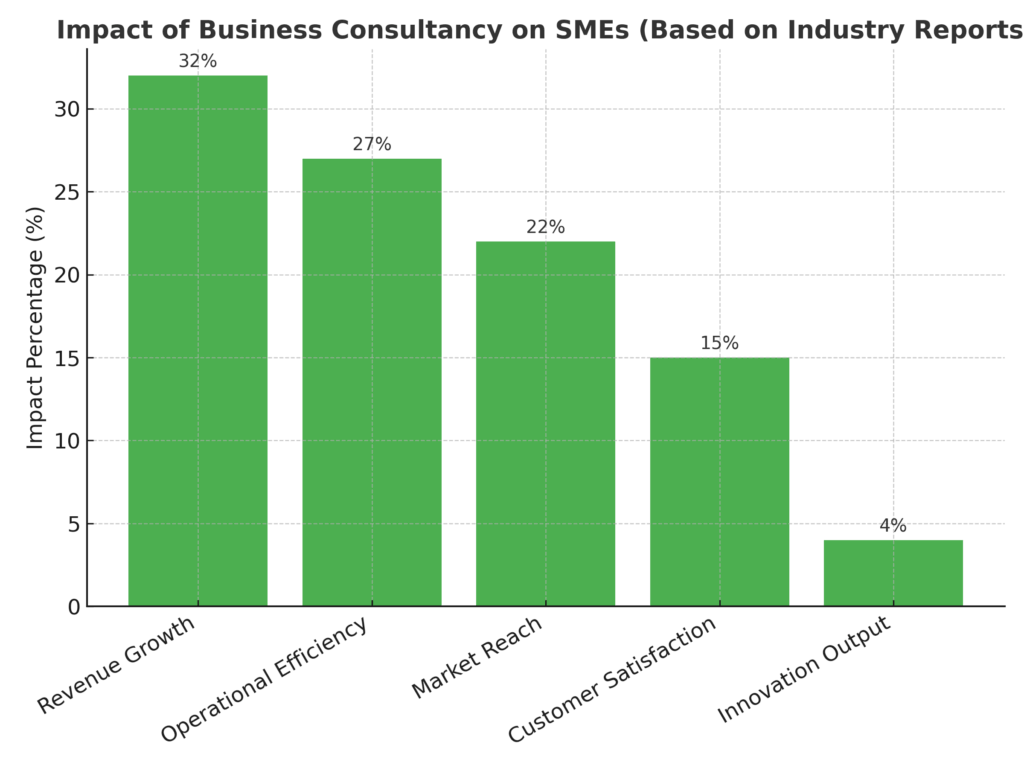
The Value of Business Consulting for Growing Companies — Why SMEs Benefit Most from Boutique Firms
Business consulting boosts strategy clarity, operational efficiency, marketing effectiveness and sales performance. Evidence-based studies show management consulting can increase productivity, sales and profits for small and medium enterprises. For SMEs, boutique consultancies often deliver better fit, faster execution, and greater ROI because of deep specialization, closer client engagement, and capital efficiency.
1. Why hire a business consultant? The practical benefits
Companies engage consultants because they add focused expertise and execution capacity — often faster and more cost-effectively than hiring in-house. The benefits cluster into four tangible areas:
1.1 Strategic clarity and decision quality
Consultants diagnose market position, competitor dynamics and internal capability gaps, combine those into a prioritized roadmap, and reduce strategic risk. This reduces wasted initiatives and accelerates time-to-impact.
1.2 Faster access to specialist skills and frameworks
Consultants bring tested frameworks (SWOT, PESTLE, Porter’s Five Forces, BMC, VRIO, conjoint analysis, etc.) and domain mastery so clients don’t need to learn by trial and error.
1.3 Operational efficiency and capability uplift
From process redesign to automation and KPI systems, consultants implement repeatable processes that cut friction, reduce cost, and improve unit economics.
1.4 Revenue and commercial uplift
Targeted work on pricing, go-to-market strategy, sales enablement, and marketing increases conversion rates, average order value, and retention — all of which boost top-line growth and margins.
2. What the evidence says — consulting delivers measurable impact
Rigorous studies show consulting produces measurable benefits for SMEs. A randomized-control trial covering 432 SMEs in Mexico (a large, peer-reviewed intervention) found statistically significant improvements in productivity, return on assets, and long-term employment outcomes for firms that received management consulting. The study observed persistent increases in employment and wage bill even five years after the intervention.
Complementary analysis found substantial improvements in sales and profitability among firms receiving consulting interventions, with some programmatic evaluations reporting average sales increases of ~80% and profit gains notably higher among treated firms. These results are consistent with multiple impact evaluations that link advisory services to stronger commercial performance.
Industry research from consultancies and business academics also underlines the commercial value of specialist design, strategy, and implementation work — particularly when consulting outputs are tightly integrated with financial modeling and execution plans.

Practical takeaway: when consulting is structured as diagnosis → prototyping → implementation with clear KPIs, it produces measurable outcomes (revenue, profit, productivity) rather than just reports.
3. Which business areas improve fastest with consulting?
Consultants typically create impact across these areas:
-
Strategy & Planning: Prioritization, scenario planning, M&A readiness, market-entry strategies.
-
Business Model & Pricing: Monetization redesign, subscription and bundling strategies, profit-model stress tests.
-
Sales & Commercial Enablement: CRM architecture, sales playbooks, incentive alignment, capacity building.
-
Marketing & Positioning: ICP definition, channel optimization, brand equity, CAC / LTV frameworks.
-
Operations & Technology: Process automation, RevOps, ERP/CRM integrations, digital transformation.
-
Finance & Funding Readiness: Forecasting, valuation scenarios, investor-ready pitch decks.
Each area becomes higher-leverage when the consulting engagement ties recommendations to financial models and measurable KPIs — a core approach we use at GrowGenics.
4. Why boutique consulting firms are often the best fit for SMEs
Large consultancies have scale and brand. Boutique consultancies bring a different value proposition that often aligns better with SMEs:
4.1 Focused specialization and depth
Boutiques typically concentrate on particular industries, functions, or stages (e.g., SaaS GTM, sales enablement for B2B). That specialization reduces ramp time and increases hit-rate for faster impact.
4.2 Higher senior engagement and accountability
Smaller firms are more likely to assign senior talent directly to projects. That means decision-makers work with experienced consultants rather than mostly junior staff, improving speed, quality, and ownership.

4.3 Faster implementation & agility
Boutiques have less hierarchy and shorter feedback loops. They can pivot recommendations rapidly in response to pilot results and emerging data — critical when experimentation and fast learning are required.
4.4 Capital efficiency and tailored scope
For SMEs that cannot absorb large retainers or long multi-phase programs, boutiques offer modular scopes and fractional talent models (e.g., fractional CROs, interim heads) that align spend with near-term ROI.
4.5 Cultural and operational fit
Boutiques often collaborate more closely with internal teams and external partners, avoiding the “hand-off” syndrome and increasing absorptive capacity — the firm’s ability to adopt external knowledge and convert it into performance. Research highlights that absorptive capacity mediates the value derived from consulting. When SMEs pair tailored advisory with commitment to internal adoption, outcomes improve materially.
5. Risks, and how to de-risk consulting engagements
Consulting can fail if the client lacks implementation capacity, if recommendations are misaligned with resources, or if the scope is vague. Best practices to mitigate risk:
-
Define measurable KPIs up front (revenue uplift, CAC payback, margin targets).
-
Pilot & validate recommendations on sample segments before full rollout.
-
Embed ownership: agree who in the client team will lead each workstream.
-
Link deliverables to operational changes (technology, hiring, incentives).
-
Plan for capability transfer so the firm retains capability after contract ends.
GrowGenics follows a proven diagnostic → prototype → deploy → scale model that reduces these risks and ensures recommendations are financially modeled and governance-ready.
6. Evidence snapshot — measured impacts from studies
-
Employees: +50% (long-run increase in employment/wage bill reported in RCTs).
-
Sales: +80% (reported average sales increase in some program evaluations).
-
Profits: +120% (reported profit improvements in impact studies).

7. How a boutique firm like GrowGenics ensures measurable results
At GrowGenics we combine boutique advantages with rigorous, data-driven execution:
-
Tailored Diagnostic: SWOT, PESTLE, Business Model Canvas, Conjoint Analysis and Funnel Autopsy to identify the highest-leverage opportunities.
-
Financial Impact Modeling: Every recommendation includes revenue and cost simulations, break-even timelines, and risk scenarios.
-
Prototype & Pilot: We co-develop prototypes (pricing variants, channel experiments) and validate with real market tests.
-
Execution & Measurement: We implement the stack (CRM, RevOps, automation), set dashboards and run iterative optimization cycles.
-
Capability Transfer: We train teams and provide playbooks so outcomes are repeatable after engagement.
8. Practical checklist for SMEs considering consultants
Before signing, ensure the consultant offers:
- Clear KPI-linked scope and deliverables.
- References & case studies relevant to your industry.
- A pilot-first approach with financial projections.
- A governance plan that embeds your team.
- Flexible resourcing (fractional experts, short sprints).
Consulting is an investment in decision quality, speed, and capability. For SMEs looking to scale, boutique consultancies deliver a highly attractive combination of domain specialization, hands-on senior involvement, and capital-efficient delivery. Empirical research shows that well-designed consulting interventions can produce large, persistent gains in employment, sales, and profits — especially when firms are ready to adopt change and measure progress.
If your company is evaluating consulting help for strategy, business model innovation, marketing, or sales enablement, consider a boutique partner that pairs senior expertise with financial discipline and a clear path to measurable outcomes.
References & Further Reading
-
Randomized Evaluation: The Impact of Consulting Services on Small and Medium Enterprises (field RCT) — J-PAL / related publication. povertyactionlab.orgChicago Journals
-
Can Management Consulting Help Small Firms Grow? — Stanford Social Innovation Review (program evaluations and synthesis). ssir.org
-
The Business Value of Design — McKinsey & Company (insight on design & strategic value). McKinsey & Company
-
Consulting Is More Than Giving Advice — Harvard Business Review (principles of effective consulting). Harvard Business Review
-
Business Consulting and SME Performance: Absorptive Capacity role — Scholarly article (on absorptive capacity mediating consulting benefits). jsbs.scholasticahq.com


